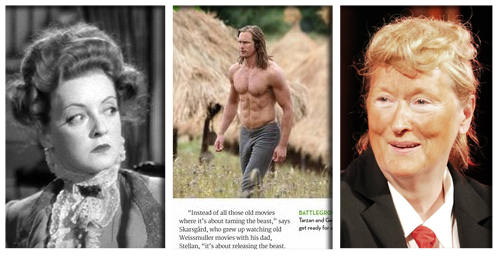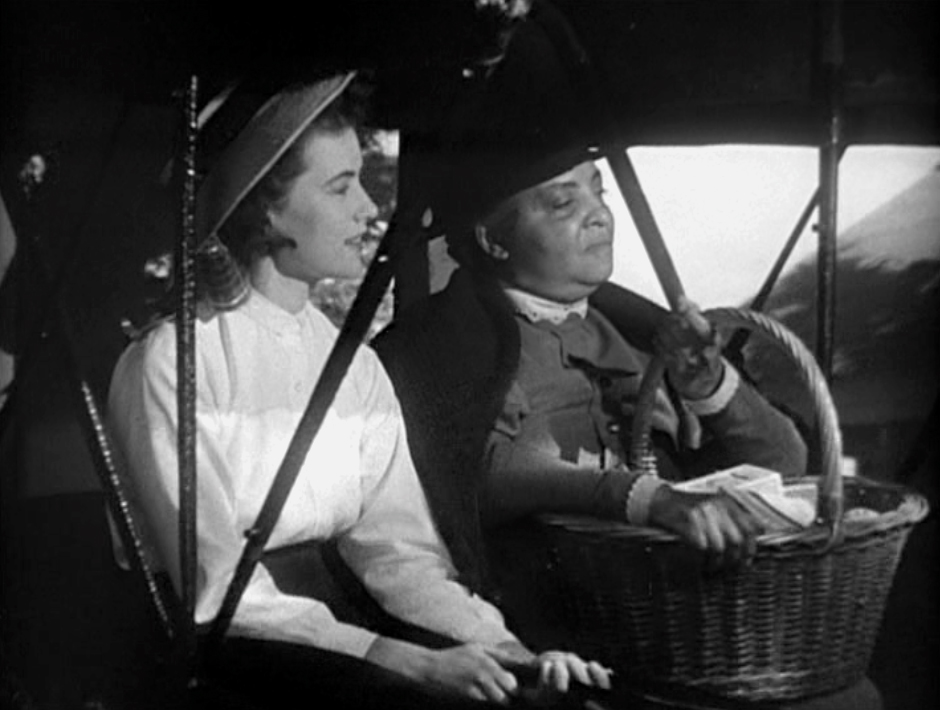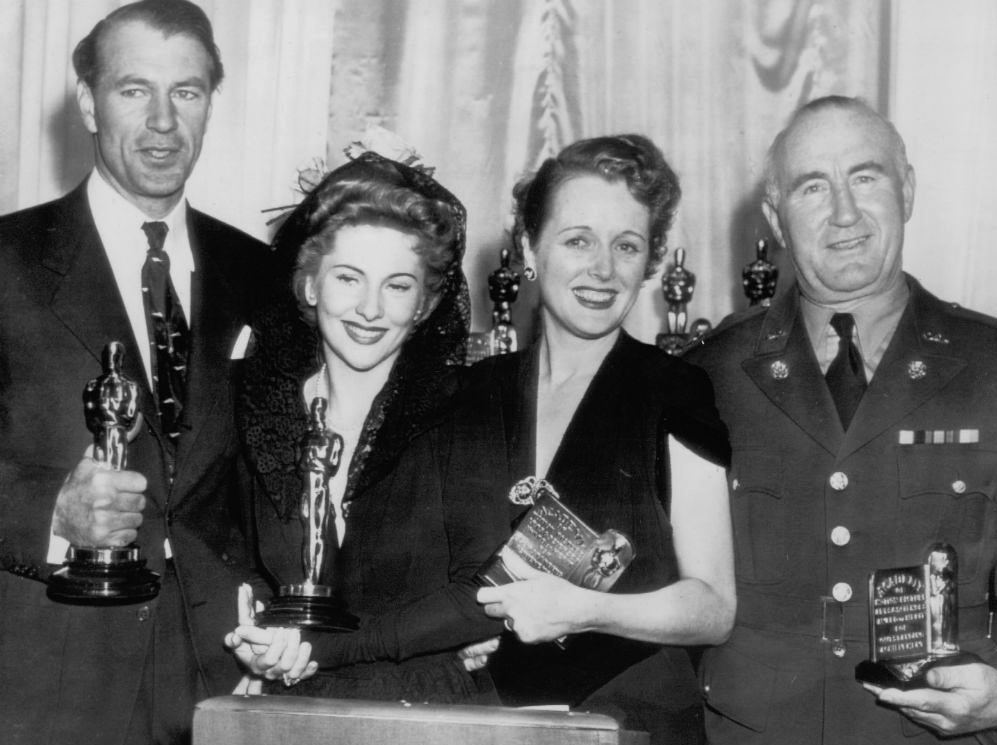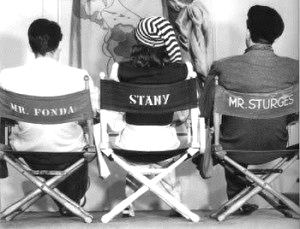Behold the Supporting Actresses of 1941, two stalwart mothers, two helpless pawns, and one reckless diva. All but one of them, the diva and eventual winner, were in Best Picture nominees in this highly satisfying Oscar showdown.
THE NOMINEES
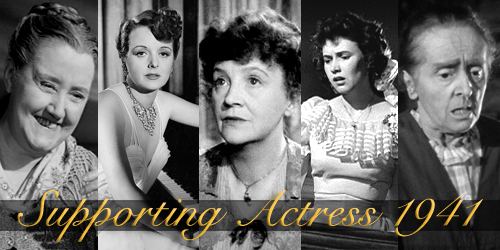 Allgood, Astor, Collinge, Wright, and Wycherley
Allgood, Astor, Collinge, Wright, and Wycherley
Oscar had entered its teenage years by 1941, (14th annual Academy Awards) but it was still a green enough institution that all of its supporting actresses were first timers. Mary Astor, who won the Oscar, was the only star among the nominees and she was having a great year also starring in the noir classic The Maltese Falcon. Career momentum issues should never be underestimated with Oscar outcomes. Astor was joined in the shortlist by two sturdy character players in their 60s: the British stage actress Margaret Wycherley and the Irish screen actress Sara Allgood (who had been featured in some early Alfred Hitchcock movies). Rounding out the nominee list were two true finds making their charmed film debuts in the Best Picture nominee The Little Foxes, Patricia Collinge and Teresa Wright, the latter of whom was an instant darling in Hollywood and would win the Oscar the following year for Mrs Miniver. There's that momentum factor again.
THIS MONTH'S PANELISTS
Angelica Jade Bastien, Anne Marie, Nick Davis, Nathaniel R, Stinkylulu and You - we tabulate reader votes and quotes from your ballots appear!
Without further ado, the main event...
1941
SUPPORTING ACTRESS SMACKDOWN

SARA ALLGOOD as "Mrs. Morgan" in How Green Was My Valley
Synopsis: A mother of six boys and one girl watches her family come apart over the ravages of coal mining on their once idyllic town
Stats: 62 yrs old. First and only nom. 36 minutes of screen time (or 30% of running time).
Angelica: Warmth, teary-eyed noble sense of self, and protectiveness indicative of a mother figure in a picture that displays the ways things were. There are brief, interesting flashes that give her character more weight but even then it isn’t a performance I would care to revisit or even felt particularly moved by. ♥♥
Anne Marie: The Academy does love its long-suffering mothers. Allgood is appropriately fierce and folksy. Unfortunately, she's never given much to do. Her banter with the father is great and she does bring some humor, but at no point does Allgood play Mrs. Morgan as a believable three-dimensional character instead of Welsh window dressing. Allgood adds little to the film besides extra saccharine nostalgia-- something with which How Green Was My Valley already overflowed. ♥♥
Nathaniel: Her famous mother tiger speech with an elemental storm whipping up around her is actually the least of it. It's in the gestures and physicality that she transcends: leaning defeated against her doorway, a hilariously broad moment with socks and shoes, arms outstretched or swiping at her sons and husband, and two wrenching atypically still moments (involving gossip and a mining accident, respectively) when she's lost in worrying thought. It's silent film acting at its best and who needs the sound in How Green Was My Valley anyway? ♥♥♥♥
Nick: Allgood’s fairly generic and physically typecast as the stalwart mother in Ford’s mining-town memory-piece, winning her nomination by being one of few women in a male-driven frontrunner. Her big scene admonishing strikers who have ostracized her husband feels awkward and unmodulated. She’s better with a late, blank-faced close-up before an empty elevator platform, but she’s just delivering on directorial instructions. I see few of the subtleties an Anne Revere might have brought to this part ♥
Readers: "Essentially pretty thin but leaves a fond memory nonetheless. She's playing a cliche, and more or less playing into the cliche but she's adorable at it.." - Goran (reader avg: ♥♥♥¼)
StinkyLulu: Allgood’s Mother Morgan feels like a collection of snapshots gathered in a scrapbook. Her declamatory zeal and stalwart spirit vividly animate this archetype in the instant (and in ways that reveal the actress’s roots in the Irish theater). But her captivating constancy seems to lack the independently clarifying continuity necessary to cue a coherent characterization amongst the scattered, glancing episodes the film affords her. ♥♥
Actress earns 14¼ ❤s

MARY ASTOR as "Sandra Kovak" in The Great Lie
Synopsis: a famous concert pianist becomes pregnant with the child of another woman's man
Stats: 35 yrs old. First and only nomination. 47 minutes of screen time (or 43% of running time).
Angelica: Astor is a maelstrom of female desire. For the most part she is able to strike the right balance between the glamour, vulnerability and the surreal nature needed for women’s pictures. Even better she looks like she’s having fun while doing so. She especially does interesting things with her voice as she purrs, cracks, and devours her way through the film. ♥♥♥♥
Anne Marie: In a diva-off, Astor goes at Bette Davis with her well-manicured claws out and damn near walks away with the picture. Considering the film, that's not saying much. The Great Lie thrives on its leading ladies' explosive rivalry. Whenever they're apart, the seams in the melodrama begin to show. Astor throws shade like a pro, but she can't distract from a ridiculous film. A fun performance, but ultimately unworthy of an Oscar win. ♥♥♥
Nathaniel: The Great Lie requires more than a few scenes for acclimation - yes, you're watching a Bette Davis movie in which a chain-smoking love-to-hate-her diva drops death stares with quips and that woman is NOT Bette Davis. Astor struts around with such supreme entitlement that you absolutely believe that she thinks of Davis as her supporting actress. Astor's hot exclamatory moods and chilly threats reverberate in exactly the same way those huge chords she keeps dropping on the piano, do -- BOOM! Here's your drama, bitch. ♥♥♥♥
Nick: Astor plays her first scene as comedy; you can see The Palm Beach Story around the corner. Later, she reprises some cooped-up anguish from Red Dust, pitched even higher. She and Goulding let the tones in her performance veer a little broadly… but she’s still typically entrancing. Her physical gestures, her implacable will, her acting of the character’s own acting, her brilliant reading of the one-word line “Money”: they all make her a worthy duet-partner with Davis, elevating the tawdry Great Lie into something special. ♥♥♥♥
Readers: "Glorious. Thanks to Mary's enormous skill rather than being offputting she's fascinating." - Joel (reader avg: ♥♥♥♥)
StinkyLulu: True, I never quite buy the character’s supposed dissoluteness (and — with George Brent at the tip — this is one tepid love triangle). Even so, Mary Astor’s arch, aristocratic vulnerability in the role of hard-partying, pampered recording artist is somehow genuinely compelling. But Astor’s most enduring, most delicious accomplishment here? Being the femme formidable enough to bring out the stone butch we all knew lived deep inside Bette Davis. ♥♥♥♥
Actress earns 23 ❤s
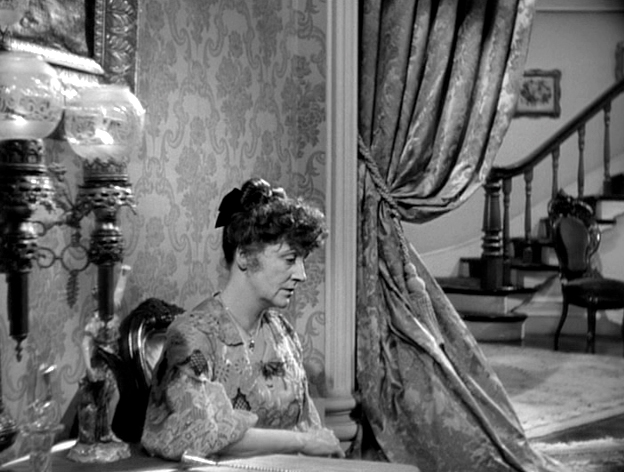
PATRICIA COLLINGE as "Birdie Hubbard" in The Little Foxes
Synopsis: an alcoholic mistreated wife warns her beloved niece, who she worries will end up just like her, about the lack of love in her family
Stats: Then 49 yrs old. Film debut! First and only nod. 21 minutes of screen time (or 18% of running time).
Angelica: Bringing almost harsh buoyancy to the role. The most moving, powerful moments are when we see how utterly depressed she is at the lack of worth she carries in her family. In these solemn moments we can see how depression changes the architecture of her face, the slope of her shoulders, creates subtle changes in her voice. While she can’t wrestle away the attention away from its lead she is an interesting counterpoint of older, southern femininity to Bette Davis’s Regina. ♥♥♥♥
Anne Marie: Lillian Hellman wrote Birdie to be a symbol of the genteel South that was destroyed by Reconstruction. Patricia Collinge makes Birdie Hubbard into something more: a fragile, whole woman, layering constant fear with hopeful sweetness. Each time she’s abused, Birdie crumbles a little further before shoring herself up behind a flimsy smile. Rather than fall into martyrdom, Collinge tempers Birdie’s victimhood with the wisdom that Birdie’s most pitiable pain comes from her desperation to be loved. ♥♥♥♥♥
Nathaniel: Whole scenes go by in which we only see her, if we see her at all, observing silently, dead still, from a corner; she's mere wallpaper to the vipers around her. The character's story may be over-explained in a final monologue (we got the gist from Collinge's work) but the actress wrings it for maximum anxious humanity and absolutely sells the depth of affection and alarm for her niece in two gorgeous face-dropping sequences. ♥♥♥♥
Nick: Birdie Hubbard, the “Aunt Fanny” of The Little Foxes, is less formidable than Agnes Moorehead in Ambersons but Collinge endows her with comparable charisma, making her loneliness and blather into something magnetic. Her tipsy showcase monologue discloses brutal self-awareness but not total self-awareness; she doesn’t redeem Birdie’s dissipation as a removable veil or unfair projection. Sad, funny, earnest, she safeguards the crucial “sym-” in “sympathetic” and communicates wonderfully in deep-focus backgrounds without pulling focus. ♥♥♥♥
Readers: "In an often icy film about reducing life to a financial transaction, Collinge makes her very humanity read as cumbersome baggage to her husband's success, profoundly earning her character's tragedy." -Sean D. (reader avg: ♥♥♥♥)
StinkyLulu: Collinge has such a clear handle on the character of Birdie Hubbard — perhaps the most tragic flibbertigibbet in all of American dramaturgy — that it’s a shame that neither she nor Wyler seemed to quite figure out how to bring that clarity to camera. I remain convinced that Collinge is delivering a devastating performance; it just happens to be right outside of (or simply flattened by) Wyler’s frame. ♥♥
Actress earns 23 ❤s

TERESA WRIGHT as "Alexandra Giddens" in The Little Foxes
Synopsis: A young woman tries to make sense of her family's shady dealings as her goodhearted father takes ill and a reporter comes courting
Stats: 23 yrs old. Film debut! First of three noms. 41 minutes of screen time (or 35% of running time).
Angelica: Even though I’ve seen this film several times one constant remains: how much this performance annoys me. In the beginning, she comes off as almost too naïve and wide-eyed. Her innocence isn’t lovely but shrill. She gets more interesting shadings as she questions her mother. But still she brings little nuance or depth to a role of a young girl finding her sense of self in the shadow of a monstrous mother figure. ♥♥
Anne Marie: Someone has to be the soul of the film. Xandra spends a lot of time being lectured to, but Wright plays her as an active, empathetic listener. Even if she's heavy-handed with Xandra’s more petty and childish side, her commitment justifies that dramatic turn in the last act. Wright would play a similar character in Shadow of a Doubt, and maturity would give her the ability to build a steadier character arc. ♥♥♥♥
Nathaniel: Teresa's brand of noble and naive earnestness, too pure to be completely undone by the hard truths she suddenly learns about a monstrous loved one only works for me in Shadow of a Doubt (1943) but I'm glad she had this arc to play for a dry run of that vastly improved star turn. But in this utterly amazing ensemble and this fine Oscar shortlist, she's the weak link, however capable she is at dramatizing true affection and dim awareness. ♥♥
Nick: By 1943’s Shadow of a Doubt, Wright nailed her distinctive balance of sweetness and mettle. In The Little Foxes, she’s just getting started. I’m not yet fully sold. My favorite moments involve her quizzical, slightly shamed response to her semi-suitor’s excitement that she’s finally defying her mother—as if she never perceived her own acquiescence. But she overdoes girlish naïveté in early scenes and could afford a smidge more power in later ones. ♥♥
Readers: "This year's theme seems to be that Bette Davis elevates all her costars' performances..." -Suzanne (reader avg: ♥♥⅓)
StinkyLulu: Teresa Wright is absolutely adequate as the young Alexandra, reliable and effective, playing childlike innocence as plausibly as she conveys early onset cynicism. Though her handling of Hellman’s declamatory chatter might be less expert than the old pros surrounding her, Wright’s vivid acuity delivers her best moments, especially as she “listens” and learns. ♥♥
Actress earns 14⅓ ❤s
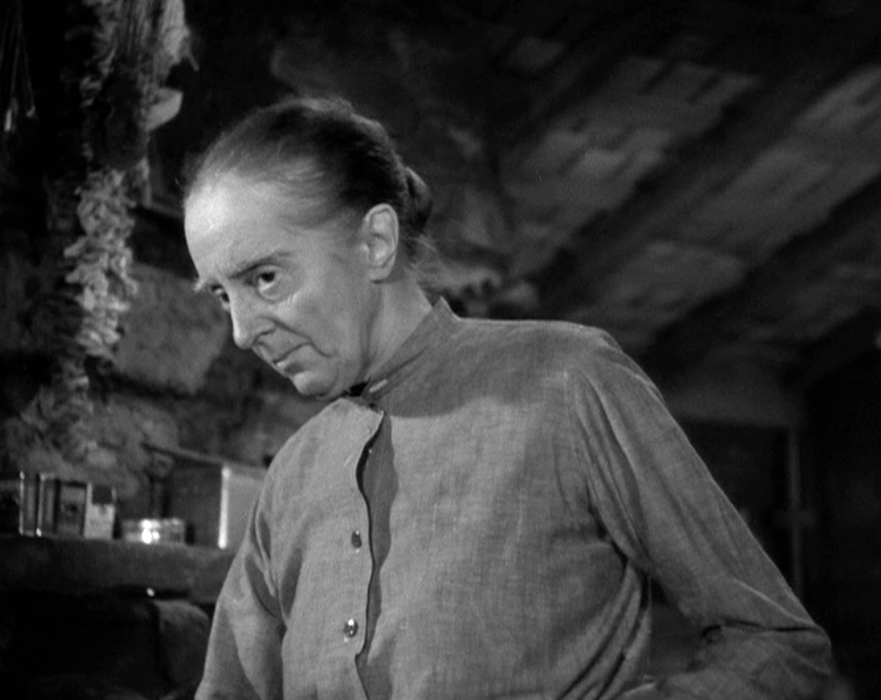
MARGARET WYCHERLEY as "Mother York" in Sergeant York
Synopsis: A farm widow worries and prays for her wayward eldest as he tries to find his way in the world before leaving for war
Stats: 60 yrs old. First and only nom. 18 minutes screen time (or 13% of running time).
Angelica: There is a quiet presence and wisdom brought to the role. But at the same time even if she plays the role well she plays it exactly as expected. There is no interior life to the character so maybe I shouldn’t be too surprised at how little of an impression she left on me. ♥♥
Anne Marie: Another fiery, folksy mother, this time the American model. Like Allgood, Wycherly doesn't get much to do except act noble, inspire nostalgia, and quote the Bible. Wycherly played a terrifying mother in White Heat, so she clearly had the ability to create vibrant characters, even if her limited screentime prevents her from doing so in Sergeant York. When playing poor-but-proud characters, there’s a difference between “simple” and “simplistic.” Unfortunately, Wycherly's Ma York is the latter. ♥
Nathaniel: The filmmaking does all the heavy-lifting, continually cueing up a reverent theme when Mother York enters a frame, but it rarely asks much of her once it's given Still and all, in a sea of broad ACTING caricatures and bizarre Tennessee accents, she manages a surprising amount of earth-worn toplands authenticity. And I love her lack of sentiment when eyeing her wayward son. ♥♥
Nick: A distinguished graduate from the Of Beulah Bondage school of supporting actressing, Wycherly brings a similar, rough-hewn, cabin-folks understatement to all her scenes—even a late reunion that could easily have gone lachrymose. Such consistency, clearly enforced by her director, speaks to both the performer’s admirable resolve and the limited parameters of the role, as conceived and executed. Points for her distracted fingering of a wicker basket while defending her son from local judgment. Business! ♥♥
Readers: "Ma York may not say a lot, but still waters run deep, thanks to Wycherly." - Tom G. (reader avg: ♥♥)
StinkyLulu: At first, Margaret Wycherly’s cadaverous clarity in the role of Sergeant York’s mother freaked me out. (Was she the live model for the witch in Snow White or what?) Then I became fascinated by (and even fond of) Wycherly’s “Country Crone” version of archetypal mother love. Sure, it’s all penetrating gazes and impenetrably homespun homilies, but Wycherly’s clarifying presence anchors this film’s (and Cooper’s) unexpected effectiveness, which is sorta what actressing at the edges is all about. ♥♥♥
Actress earns 12 ❤s
AND THE SMACKDOWN GOES TO... ???
Oscar chose Mary Astor, the most famous and accomplished of the nominees prior to 1941. The Smackdown panel loved her, too. But maybe we should have Bette Davis, 1941's good luck charm in this category, break the news to her.
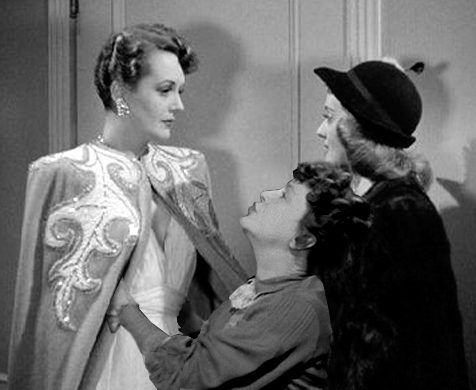
Look at it this way, Mary. We already shared a man and a child... You have practice!
Mary Astor has to share the Smackdown win! In a shocker, despite five panelists and all reader ballots tabulated, we have to call it a draw.
The winners are Mary Astor & Patricia Collinge in a tie!
 Thank you for attending!
Thank you for attending!
If you enjoyed it, share it on facebook or twitter or other social media sites. Surely you have a friend who loves Old Hollywood! If you're new to the Smackdown we've revisited 1952's pie-throwing brawl, 1968's sinister sapphics, 1980's warm hugs, and 2003's messy histrionics. Previously over 30 Smackdowns were hosted @ StinkyLulu's old site.
Further Reading? If you'd like to dig deeper, here's the way these five characters are introduced, a tribute to How Green Was My Valley, and the Best Leading Actress (non-Oscared) from '41, twice over. Our panel also sounded off on other Supporting Actresses worth your time.
What's next for the Smackdown?
We've scheduled this whole summer in advance for your viewing pleasure. For June we'll be celebrating 1964 all month (consider it a 50th anniversary spectacular) so queue up a storied and interesting quintet of films: My Fair Lady, The Chalk Garden, The Night of the Iguana, Hush Hush Sweet Charlotte, and Zorba the Greek and join us by sending in your reader ranked votes and commenting on the '64 festivities. In addition to the Smackdown fiilms, we'll look at the James Bond film Goldfinger and possibly a few more titles to be determined.. Any requests?
 Wednesday, June 8, 2016 at 9:36PM
Wednesday, June 8, 2016 at 9:36PM 